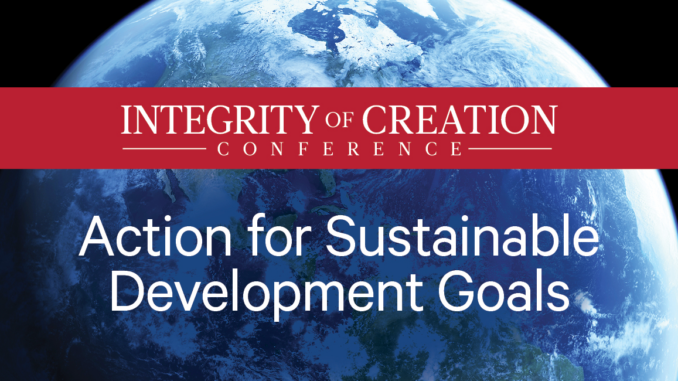
Nicholas Zotos | Social Media/Ads Manager
March 30, 2023
In the spirit of recognizing the importance of sustainability, Duquesne University has emerged as a leading institution in acknowledging, educating and promoting related goals.
Tuesday and Wednesday this week, the Duquesne hosted the Integrity of Creation Conference to provide the scholarly community an opportunity to engage in established and emerging research on sustainability. In their mission, speakers also hoped to enhance public awareness about environmentally conscious practices.
“As educators at Duquesne University, we seek to prepare young men and women to not only excel in their chosen careers…but we also want them to influence others for the better. This conference will do just that,” said President Ken Gormley in his opening remarks Tuesday evening.
The conference proceeded with academic speakers who reflected upon their own experience with sustainability and the challenges they faced in their respective education medium.
“Sustainability is about humans, it is not just about science,” said guest speaker Kate Nelson, a founder of the University Sustainability Committee at the University of Minnesota. “Climate change, growing waste reserves and lack of clean water will impact all of us.”
Preliminary presentations, like Nelson’s, sought to educate students about ways they can begin eco-friendly practices right here at Duquesne.
“Students should be interested in pursuing sustainability goals,” Nelson said. “We must educate others about our lack of sustainability. They [students] must understand that a stable world transcends political agenda.”
Conference speakers also sought to reiterate the Catholic position on climate change – primarily that religion does not negate our responsibility to the environment.
“The current Pope Francis states that we have to be good stewards to the environment. Particularly, we must understand our role in influencing animals and resources,” said speaker John Stolz, a senior professor in the biology department. “Students need to understand that science and religion coexist, especially in regards to sustainability.”
The conference continued with student and professional presentations reflecting on existing and future research about global sustainable objectives.
“Most students come to Duquesne because of the Spiritan mission. At the very core of that mission is the integrity of creation,” said Gerard Magill, Center for Global Health Ethics professor and coordinator of the Integrity of Creation conference. “At a time where climate change has the ability to significantly impact our world, our mission to educate and mitigate the effects of these changes is now more clear than ever.”
In a specific effort to meet this mission, Duquesne has recently established a sustainability board with the purpose of reducing adverse environmental waste on campus and providing clean resources for its students.
“We must start thinking about sustainability in everything we do. With this in mind, we will emerge as a leading regional and national university,” Magill said.
The conference ended with remarks from a representative from a local leader in ethical environmental responsibility, Pittsburgh Plate Glass (PPG).
PPG, through innovation, has been able to provide coating on large cargo ships that allows for the vessels to last longer and sail smoothly through water, said PPG director of global customer sustainability, Jennifer Dodson. This in turn reduces oil usage, which reduces cost but also reduces material waste and Co2 emission.
“Sustainability for us, and for so many more, is more than just about profit. Sustainability is dynamic,” Dodson said. “Lasting efforts require engagement and accountability across all sectors of our society to be impactful.”
